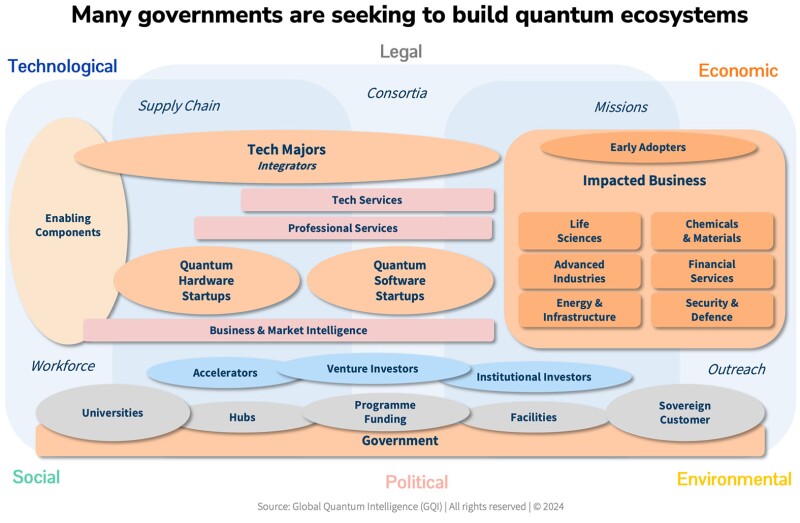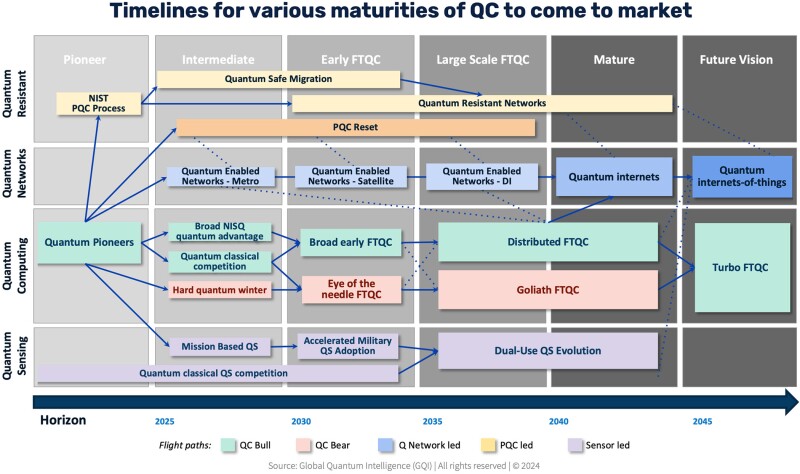This past June, the United Nations proclaimed 2025 as the International Year of Quantum Science and Technology to recognize the potential of quantum science to drive innovations in sustainable development and global communications.
It is also a recognition of how far the theoretical concept of quantum computing has come to become a reality, and the race to build a powerful quantum computer is accelerating every year. According to a recent report from Global Quantum Intelligence, the impact of quantum tech across the oil and gas industry could equate to $2.6 trillion by 2035.
As the first chief data scientist in the oil and gas industry, I am acutely aware of the myriad challenges that our industry faces.
I firmly believe that quantum computing and related quantum technologies are on the brink of revolutionizing our industry in ways we have yet to fully comprehend. The quantum revolution demands that the oil and gas and the broader energy industry rethink their approach to exponential technology and sustainability.
The industry's history of adopting emerging technologies, as evidenced by the slow uptake of digital transformation, underscores the urgency of this shift. Even 30 years after the introduction of the digital oilfield concept, the industry lags in data quality, addressing data silos, and data democratization, as compared with other complex and highly regulated industries.

The urgency of an energy transition towards a sustainable future necessitates the oil and gas industry to confront its complex challenges, which are beyond the scope of current computing power. Quantum computing, with its unparalleled computational power, emerges as one of the most promising technologies to optimize and accelerate solutions to the industry's intricate problems.
As we discuss quantum computing in detail, we will explore how related quantum interconnected areas—quantum sensing, quantum networking, and quantum simulations—will enable unique applications for the oil and gas industry.
In simple words, quantum computing is the field of computing that uses the principles of quantum mechanics to solve complex problems that are intractable for classical computers.
The three main principles of quantum mechanics that are the cornerstone of quantum computing are superposition, entanglement, and quantum interference.
Unlike traditional computing, where a bit (0 or 1) is the basic unit, a qubit is the unit of quantum computing. A qubit can exist in a state of 0, 1, or both simultaneously due to superposition, enabling parallel computations and the exploration of multiple solutions at once.
Entanglement allows for correlated states, enabling operations on multiple qubits simultaneously for enhanced computational power. Quantum interference allows quantum states to interfere constructively or destructively with each other, amplifying correct solutions and suppressing incorrect ones, thereby empowering efficient computations.
Thus, a significant quantum advantage is gained by using quantum computing for certain computationally challenging problems compared with traditional computing. Quantum computing will be performed on quantum computers, which are developed today using various technologies such as photonics, light particles, trapped ions, neutral atom traps, superconducting qubits, and controlling nitrogen vacancy centers in imperfect diamonds.
At present, there are three main types of quantum computing paradigms:
- Quantum Annealing is easy to build and excels at solving optimization problems.
- Quantum Emulation simulates quantum interactions on classical computers.
- Universal Quantum Computers require thousands of physical qubits and are yet to be fully realized.

Quantum Use Cases in Upstream
Let's look at a few essential areas of oil and gas operations that can benefit from the advantage of quantum computing. These applications have the potential to reduce capital waste and nonproductive time (NPT) in the industry.
The industry's supply chain and logistics are known to have inefficiencies ranging from 30 to 50%, which in turn also increase the value lost due to NPT. Optimizing the supply chain involves an interplay of a complex set of variables which could potentially be done by quantum computing algorithms. ExxonMobil has partnered with IBM to develop such algorithms to help fine tune its liquefied natural gas maritime routing.
Seismic data interpretation remains a computational challenge in terms of efficiency and effectiveness. Quantum computing algorithms and quantum machine learning can process and analyze seismic big data rapidly, allowing for faster imaging of the subsurface, in turn leading to better return on investment compared to current methods.
Well placement is another complex and challenging process. A most essential step to bringing oil to the surface, placement of the well needs to be optimized to reduce the cost of production. The industry has used various traditional, nontraditional, and hybrid algorithms to find the optimal location for wells. Many of these methods need to be faster to converge, and accuracy remains a challenge and gets even more challenging with the reservoir heterogeneity.
For each reservoir, one needs to develop and compute different models. However, it would be better if a model existed that used the same search algorithm irrespective of reservoir heterogeneity, allowing the model to span all options in real time and evaluate the cost function associated with each of the possibilities. Here, quantum-enabled search algorithms can provide speed and accuracy for well placement.
Reservoir simulations essentially involve various numerical methods to solve various partial differential equations (PDEs) for reservoir flow. The two aspects that are simulated use the diffusion equation for pressure, and the other one relates to water saturation. Several numerical methods are used, such as linear equation solvers and discretizing PDEs. When such solving methods are augmented with quantum approaches like variational quantum methods, one can find a converged solution faster than traditional methods. The use of quantum computing in this area is in its infancy but shows great promise.
Quantum sensing is among the fastest-growing areas of the quantum ecosystem that shows great potential across the energy industry. Due to quantum entanglement and coherence, quantum sensing allows for measuring physical quantities with greater sensitivities than classical sensors. In short, quantum sensors might be used to detect oil and gas in the subsurface with higher accuracy compared to existing technologies. There are many additional areas where these quantum sensors can be deployed.
The industry is increasingly reliant on prognostics and health management software to understand and predict the failure of machines. Common applications include centrifugal pumps, submersible pumps, and compressors.
In the past few years, various machine learning and deep learning techniques have been adopted by industry to get a better understanding of failure modes. However, preliminary studies using quantum machine learning have resulted in more accurate results in predicting failure modes that, in turn, help reduce downtime.
While we discussed some of the specific areas in the upstream oil and gas industry where quantum computing can help, there are other related areas as well. For example, algorithmic material design, where quantum many-body (many-particle) computations of material properties can lead to more efficient, cost-effective, and sustainable materials. These better materials can be used during drilling, carbon capture, and other workflows in the industry.
Challenges and Path Forward
Despite the potential benefits of quantum computing, there are some challenges ahead for organizations to wrap their research and development strategy around it. One of the first and foremost hinges on the question of when quantum computing will be widely available for mainstream business.
The answer is simple: no one knows, but many large companies and many well-funded startups are engaged at a feverish pace to make mainstream quantum computers a reality sooner rather than later. More than 39 governments have announced an aggressive quantum strategy roadmap so companies can focus on developing such a computer.
However, leaders should not wait for the availability of realistic quantum computers, as many of the challenges that need speedy and precise solutions can take advantage of quantum‑inspired computing today.
Quantum-inspired computing is available on cloud platforms from a number of big-name providers. So, what is quantum-inspired? It involves formulating the problem in a way that is directly amenable to physical quantum computers and solving the formulation using principles of quantum mechanics, and then running these algorithms on traditional computers available now.
Gaining experience with quantum-inspired computing will help reduce the time to implement when real quantum computers become available. It will also allow one to quantify the extent of the quantum advantage that can be gained with quantum formulation for various specific applications. Another advantage of quantum-inspired is that it might be able to obtain multiple reasonable solutions in a short period of time compared to performing similar computations on traditional computers.
The time is now for the oil and gas industry to invest seriously in the quantum ecosystem. Even though the oil and gas industry recognized the importance of digital transformation in reducing costs and capital waste, improving efficiency, and enhancing safety and environmental-social-governance scores, it remains one of the laggards in adoption.
The industry has a history of relying on legacy systems and outdated processes and workflows. While it needs to catch up on regulatory and safety standards due to the slow pace of digital transformation, a more significant factor is the need for preparedness and cultural barriers that hinder the adoption of emerging technologies.
One of the significant challenges the industry is facing and will continue to face in adopting and adapting to the quantum world and post-quantum era is the workforce.
Most of the workforce that works on emerging and exponential technologies in the industry is self-trained and has minimal to no investment by the companies. As such, there is a shortage of talented workforce in the quantum industry worldwide. As it is, many quantum computing companies are busy training their workforce in quantum hardware, principles of quantum mechanics, quantum algorithms, quantum machine learning, and associated technologies to expand their teams and meet growing demand.
The author has been consulting with industry leaders about the current state and the evolving maturity of quantum computing. In workshop surveys with these leaders, we see that 90% indicate that their organizations need a roadmap for taking advantage of the quantum ecosystem. In many oil and gas companies, there are just one or two people who are actively engaged in the quantum ecosystem out of self-interest, with no funding from the leadership.
What I tell these executives is that the industries that will benefit from quantum information systems must prepare a trained workforce to understand, adopt, and adapt to the quantum computing world. A delay in implementing workforce readiness will result in a steep cost to the industry.

Satyam Priyadarshy, SPE, is the founder of Reignite Future and is a senior expert at Global Quantum Intelligence. He is also a former technology fellow and chief data scientist at Halliburton. He has led transformative initiatives in big data, data science, quantum mechanics, and digital transformation, providing executive consulting to global companies. As a 2021–2022 SPE Distinguished Lecturer, Priyadarshy also held leadership positions at AOL, Network Solutions, and Acxiom Corporation and co-founded startups in Washington, DC, and in Silicon Valley. He is an adjunct professor at Virginia Tech and Oklahoma State University and a senior fellow of cybersecurity at George Mason University. Priyadarshy earned his PhD from IIT Bombay and an MBA from Virginia Tech’s Pamplin School of Business.

